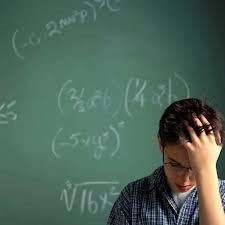
Do you dread maths? Are you doing everything you can to avoid Maths altogether because you harbor a dislike for maths? Do you freeze when asked to figure out the quantity of paint required to redo the interiors of your house or to measure out the exact quantity of the ingredients for a recipe? If yes, then you might have an anxiety towards maths.
 Then you are not alone, you are like most people who share the same fear of maths. Nevertheless, maths anxiety affects people of all ages be it a primary student or even an adult. But everyone has the ability to understand maths and you can do this by yourself also. Evidently there exist 6 simple steps to tackle this anxiety; first and foremost you need to accept that you fear maths, next you need to understand the reasons for the fear, then you need to get your basics right, learn differently, be patient and finally you need to practice, practice and then practice some more.
Then you are not alone, you are like most people who share the same fear of maths. Nevertheless, maths anxiety affects people of all ages be it a primary student or even an adult. But everyone has the ability to understand maths and you can do this by yourself also. Evidently there exist 6 simple steps to tackle this anxiety; first and foremost you need to accept that you fear maths, next you need to understand the reasons for the fear, then you need to get your basics right, learn differently, be patient and finally you need to practice, practice and then practice some more.
Step 1. Accept your Fear: it is of importance because without accepting your fear of the subject, it will make the task that much more difficult to overcome. Once you come to realise your fear, you can then begin to move forward.
Step 2. Understand the Reasons for the Fear: fear of a subject is usually due to the negative experience that one must have had with the subject while they were growing up. It could be a bad experience in school or college or failure as the case may be.
Step 3. Start with Basics: many a times the anxiety of students is due to the lack of clarity in the fundamental principles and concepts. Therefore it is preferable for students to start with their basics i.e. addition, subtraction, multiplication and division. Starting with simple calculations that you can manage will help to build your confidence in maths. It is preferable to practice on your own to prevent unnecessary pressure and to be able to fail without consequence. As Benjamin Franklin says, “Tell me and I forget, teach me and I may remember, involve me and I learn.”
Step 4. Learn Differently: not all individuals learn efficiently in a school environment since, teachers have to cater to about 50 to 100 students at a time; giving personal attention is almost impossible. Therefore students tend to learn arithmetic via rote learning which is a horrible way to learn mathematics. Formulas fall out of your head after the examination. No wonder it is so important to actually understand what the formula is doing. Talk your way through it. Relate to what is said, understand why you use one formula over another. Try drawing what the question is asking you. If you get stuck then you can just do a Google search and go from there.
Step 5. Be Patient: patience is the key to mastering mathematical principles. If it weren’t true you wouldn’t be able to succeed. The best way to succeed is to not give up and to keep trying until you succeed or else try something else. It is said that “It makes no sense trying to break a wall that will not break, you might as well look for another alternative that gets you around the wall instead.” to put it simply ‘you need to look for another alternative that will help you to succeed’. So Practice Patience and you are sure to succeed!
Step 6. Practice, Practice and then Practice Some More: most students and adults alike tend to give up only; to easily, thus hampering their progress. In the end they choose not to. Well I can’t say this enough, in order to rid yourself of the fear you have to practice, practice and then practice some more. Because you might not like it but to gain that confidence repetition and practice is what helps you to overcome you maths anxiety. To quote Jaspher Kantuna, “Practice as if you are the worst, perform as if you are the best.”
Following these simple tips will help you to over you anxiety and to improve your maths.
